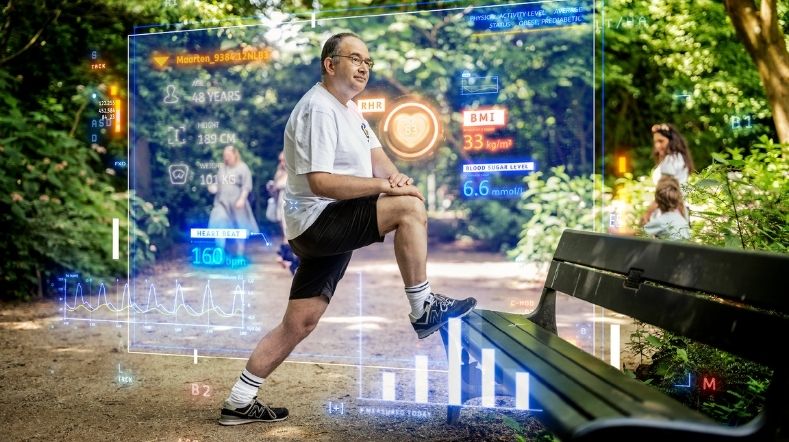
Suzan Wopereis

My main research focus is studying on the understanding of what biological mechanisms drive health, how you can measure health and deviations from health and importantly on how to intervene on an individual level with lifestyle on health (personalised health).
Research area
Suzan Wopereis joined TNO in 2006 and works within the systems biology team on ‘quantification of health and effects of lifestyle on health’. Her main focus has been on phenotypic flexibility as a measure of health, where she uses standardized challenge tests to study the response of a multitude of biological processes to quantify resilience in health optimization and chronic lifestyle related diseases such as Diabetes Mellitus type II. She coordinated the development of the standardized challenge called the PhenFlex test, which has been applied in several TNO coordinated human studies, as well as by other research groups all over the world (e.g. EWHA University (South-Korea), USDA (USA), University of East Anglia (UK)).
Furthermore, she coordinated the evidence-based scientific advice system that has been implemented by the American personalized nutrition start-up company ‘Habit’ that also applied the so called Habit challenge beverage (based on PhenFlex challenge) in their Habit self-assessment kit. Suzan is internationally recognized as an expert in the area of personalized metabolic health.
Suzan Wopereis was involved in the initiation of the Dutch Innovation Center Lifestyle4Health with the mission to reduce the societal and economic impact of lifestyle related diseases in 10 years, where she coordinates the program line ‘bio-mechanisms’ In In 2016 she was awarded the ‘Excellent researcher of 2015’ for her work on personalized nutrition. She has a PhD in medical sciences from Radboud University Nijmegen Medical Center (2006).
Recent results
In my research, I discovered that there are multiple causes for type 2 diabetes and depending on the cause of the disease one or another lifestyle treatment works better for you. I have been working on personalized lifestyle treatments for type 2 diabetes patients that have been tested in the real setting of primary care. It showed that in newly diagnosed type 2 diabetes patients such lifestyle treatment strategy of 3 months could reverse the disease for 75% of the participants, which could be maintained also after 2 years. Here you can read more:
Phenotypic Flexibility as biomarker of health - YouTube
Besides focusing on the curative setting Suzan also collaborates with multiple partners to realize evidence based applications for personalised health especially focusing on prevention of chronic lifestyle related diseases.
Recent podcasts
On personalized nutrition: What might the future hold for personalised nutrition? (foodmatterslive.com)
Top publications
-
Phenotypic flexibility in nutrition research to quantify human variability: building the bridge to personalized nutrition. S. Wopereis. Proc Nutr Soc. 2022:1-13.
-
Effects of a 13-Week Personalized Lifestyle Intervention Based on the Diabetes Subtype for People with Newly Diagnosed Type 2 Diabetes. de Hoogh IM, Pasman WJ, Boorsma A, van Ommen B, Wopereis S. Biomedicines. 2022;10(3):643.
-
Perspective: Guiding Principles for the Implementation of Personalized Nutrition Approaches That Benefit Health and Function. Adams SH, Anthony JC, Carvajal R, Chae L, Khoo CSH, Latulippe ME, Matusheski NV, McClung HL, Rozga M, Schmid CH, Wopereis S, Yan W. Advances in Nutrition 11, 1, 2020, 25–3420 doi: 10.1093/advances/nmz086
-
The Effect of a Lifestyle Intervention on Type 2 Diabetes Pathophysiology and Remission: The Stevenshof Pilot Study. de Hoogh IM, Oosterman JE, Otten W, Krijger AM, Berbée-Zadelaar S, Pasman WJ, van Ommen B, Pijl H, Wopereis S. Nutrients vol13, 7, 2021:2193. doi: 10.3390/nu13072193.
-
A Novel Personalized Systems Nutrition Program Improves Dietary Patterns, Lifestyle Behaviors and Health-Related Outcomes: Results from the Habit Study. de Hoogh IM, Winters BL, Nieman KM, Bijlsma S, Krone T, van den Broek TJ, Anderson BD, Caspers MPM, Anthony JC, Wopereis S. Nutrients 13, 2021: 1763.
-
The Circadian Clock, Shift Work, and Tissue-Specific Insulin Resistance. Oosterman JE, Wopereis S, Kalsbeek A. Endocrinology 161,12 (2020): bqaa180.
-
Current and Future Nutritional Strategies to Modulate Inflammatory Dynamics in Metabolic Disorders. van den Brink W, van Bilsen J, Salic K, Hoevenaars FPM, Verschuren L, Kleemann R, Bouwman J, Ronnett GV, van Ommen B, Wopereis S. Frontiers in nutrition 6 129. 2019.
Leiden - Sylviusweg
Sylviusweg 71
2333 BE Leiden
The Netherlands
Get inspired by Suzan
A healthy lifestyle as the best medicine


MixMasters uses TNO phenotype test to offer personalised nutrition

